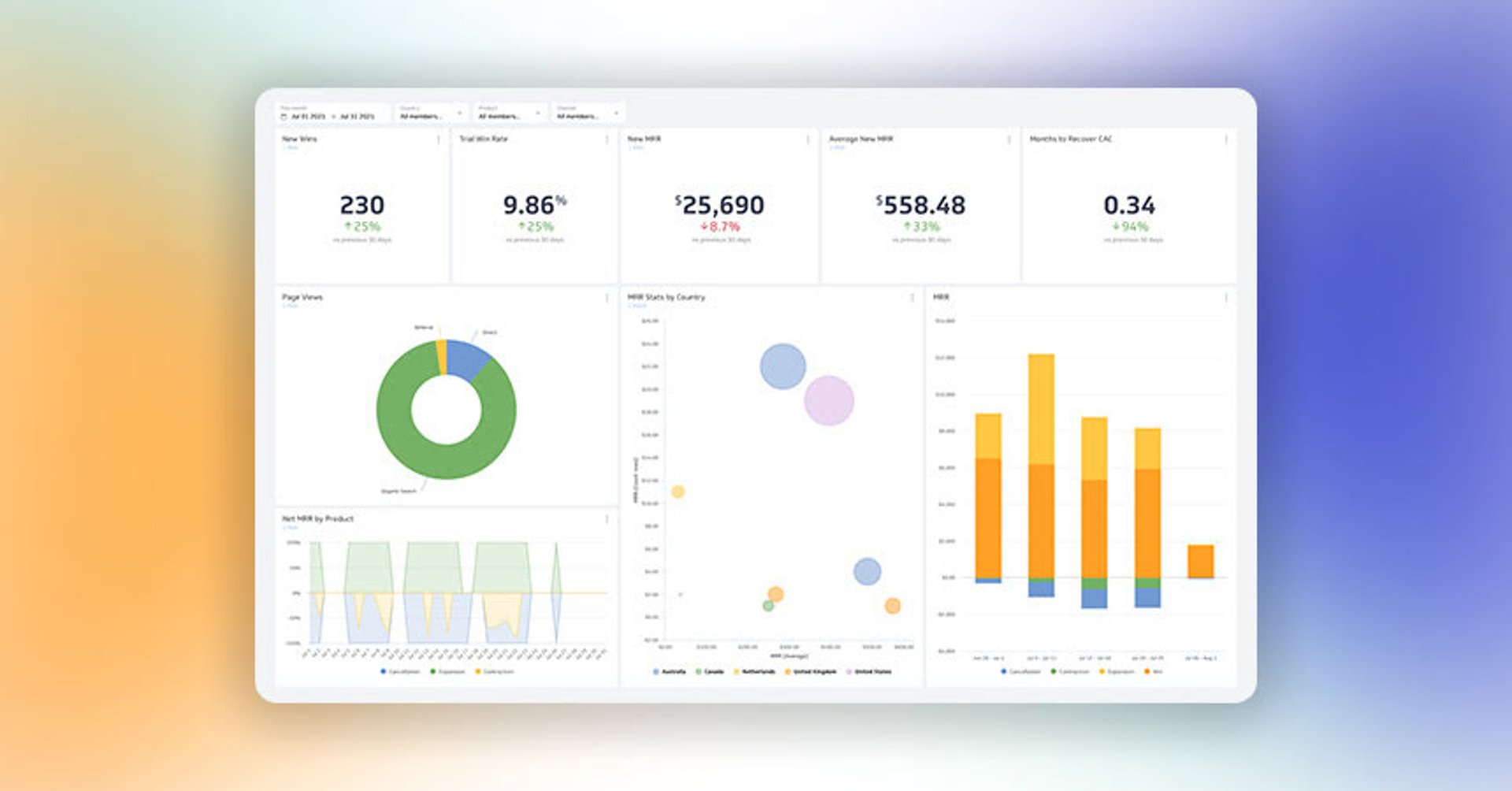17 KPIs Every Data-Driven Manager Needs to Lead Their Team

Published 2025-10-14
Summary - Motivate your team with real-time data. Learn how implementing KPI management will improve your performance as a manager, and your teams in general.
With the responsibility of steering their teams toward achieving strategic objectives, managers are the architects who design strategy and set goals for growth. The most vital instrument at their disposal is the Key Performance Indicator (KPI)—the measurable proof that ensures your team’s daily efforts align with the company’s vision.
Why should a manager prioritize KPIs?
For managers, success is not just about setting goals, but about making sure those goals translate into tangible results. Leveraging KPIs provides objective, real-time evidence that your team is on the right path.
- Track Progress: KPIs provide a clear trajectory of effort over time. If a sales team’s monthly target shows only a 5% increase toward a 20% quarterly goal, you have the data needed to intervene early. With centralized dashboards, you get the necessary information at your fingertips in a matter of seconds.
- Drive Accountability: When team members know the specific, non-technical metrics that measure their performance, success is demystified. This transparency creates a sense of ownership over their work and encourages initiative. As one customer noted, Klipfolio is the "Single Point of Truth" for all your data needs.
- Make Informed Decisions: KPIs provide real-time data , enabling you to make decisions based on empirical evidence, not stale reports. This keeps teams agile and responsive to changing business dynamics.
- Find Areas for Improvement: More than raw numbers, KPIs show you patterns and trends. Tools that "make complex data easy to understand and visualize" help you instantly spot what's hindering progress and implement targeted interventions.
Top management KPIs for different departments
Here are key metrics across different departments that your business will want to monitor to measure success against specific goals and targets.
KPIs for marketing managers
It’s important for marketing managers to be as cognizant of the organization’s sales performance as they are of marketing initiatives. In many cases, sales, which can include anything from lead breakdown to customer location, is a reflection of marketing efforts.
For example, are your webinars generating leads for the company? Questions like this interweave sales and marketing because, besides creating awareness, the bottom line is that marketing is meant to generate customers for the company. Learn more about Marketing KPIs.
- Cost per Conversion: Pinpoint which campaigns are cost-effective versus those draining resources without sufficient ROI. Add this Klip
- Marketing Expenses and Traffic: Mash up your QuickBooks and Google Analytics data to see how increased spending correlates with an uptick in web traffic. Add this Klip
- Conversion Funnel: Gain insight into how prospects advance from initial awareness to purchase (e.g., combine Google Analytics with Salesforce data). Add this Klip
- ROI: Identify high-performing campaigns by comparing conversion value against cost, which is dependent on having conversion values in Google AdWords. Add this Klip
KPIs for sales managers
To keep your sales team competitive in today’s business environment, it’s important to establish a data-driven culture by sharing relevant performance indicators and business metrics, including sales targets.
By tracking these sales key performance indicators (KPIs), you can ensure that your team has the necessary information to help your business succeed. Learn more about Sales KPIs.
- Quarterly Metrics: Provides a snapshot of performance alignment with annual targets, helping you adjust sales tactics or training as needed. Add this Klip
- Revenue and Wins by Type: Easily compare revenue and wins between new and existing businesses to identify the most profitable segments. Add this Klip
- Open Opportunities by Stage: Monitor lead volume at each sales cycle stage to forecast sales and identify negotiation bottlenecks. Add this Klip
- CAC (last 30 days): Gauge the efficiency of sales efforts. A rising Customer Acquisition Cost may signal the need for a strategy overhaul. Add this Klip
KPIs for SaaS managers
Every SaaS startup needs to monitor and track customer success through a comprehensive SaaS dashboard. Understanding your customer churn and customer retention numbers is essential for growing and scaling your business. Learn more about SaaS KPIs.
- Customer Lifetime Value (CLV): Determine the long-term value of customers. An increasing CLV signals success in keeping customers happy and offering more value. Add this Klip
- Opportunity Pipeline: View potential revenue and prospect location in the buying process for accurate forecasting and resource allocation. Add this Klip
- Monthly MRR / Expansion Rate: Track Monthly Recurring Revenue and its expansion rate to gauge business health and growth. Add this Klip
- Lead to Win Conversion by Month: Analyze the effectiveness of the sales process. Low rates may indicate issues with lead quality or sales tactics. Add this Klip
KPIs for social media managers
Social media managers must define metrics that clearly link team efforts to business goals: lead generation, increased web traffic, and overall ROI. Monitoring these KPIs with a live dashboard provides the real-time feedback necessary for timely campaign adjustments. Learn more about Social Media KPIs.
- Social Media Conversions: Quantify the direct impact of social media campaigns on business goals. High conversion rates suggest content resonates well with the target audience, helping you to quickly stick to strategies that work. Add this Klip
- Facebook Ads Campaign Performance: Measure performance to optimize ad spending for maximum impact. A campaign with high engagement and conversion rates validates the ad content and targeting, providing a template for future campaigns. Add this Klip
- Social Media Followers: A foundational metric for building and nurturing an engaged audience. Growth reflects successful content strategies and a growing interest in your brand. Add this Klip
- Social Sentiment: Understand the underlying feeling behind brand mentions across all digital channels (social networks, news, blogs). This holistic view is crucial for managing brand reputation and guiding crisis intervention. Add this Klip
KPIs for Call Center managers
Use these call center KPIs to track your team's efficiency and customer service quality, helping you navigate busy and hectic days with clear data. Learn more about Call Center KPIs.
- Today’s Calls: Tracking daily call metrics offers immediate feedback on center efficiency. A sudden spike in volume might indicate a product issue, prompting swift managerial action to address the underlying cause and maintain customer satisfaction. Add this Klip
- Average Handle Time (AHT): Measures how long it takes for a team member to resolve a customer's call from start to finish. A shorter AHT indicates efficiency, but managers must balance speed with quality to ensure issues are properly resolved—aim for the sweet spot. Add this Klip
- Customer Satisfaction (CSAT) Score: Measures how happy customers are with the service they received. High CSAT scores indicate your team is not just meeting but exceeding expectations. Monitoring this score helps you keep a pulse on customer happiness, guiding improvements to the overall experience. Add this Klip
KPIs for financial performance management
Organizational success demands a deep dive into the financial health and performance of a business. Tracking finance KPIs isn’t just about looking at the number on your balance sheets.
It’s about understanding the story behind those numbers and how they relate to your company's overall strategy and goals.
- Net Profit Margin: Measures how effectively a company converts its revenue into actual profit, guiding decisions on cost management and pricing. Add this Klip
- Current Ratio: Provides a snapshot of the business's liquidity, indicating its ability to pay off short-term liabilities with short-term assets. Add this Klip
- EBITDA: Evaluates operating performance by stripping out financing, taxes, and depreciation to provide a clearer picture of profitability from core operations.
How managers master KPI implementation
Identifying the right KPIs is just the beginning. The true opportunity lies in applying these metrics to enact real, impactful changes.
- Communicate KPIs Clearly and Consistently: Ensure every team member understands what is being tracked and why it matters.
- Centralize and Automate Tracking: Leverage dashboards to make KPI tracking a part of the daily workflow. Automation saves a "ton of time" by automatically updating data and eliminates manual reporting.
- Set Realistic and Achievable Targets: Work with your team to set achievable goals within reasonable timelines.
- Foster a Culture of Accountability and Recognition: Encourage ownership over KPIs and celebrate achievements to reinforce positive behavior.
- Regularly Review and Adjust KPIs: Be open to adjusting your KPIs to reflect current objectives or new insights.
- Use Cross-Functional Collaboration: Since Klipfolio allows you to aggregate client data from multiple platforms and view all data in one place, cross-functional collaboration is naturally simplified.
- Invest in Training and Development: Equip your team with the skills and knowledge to use the data tools effectively.
- Lead by Example: Demonstrate your commitment to KPI management by actively engaging with the metrics and sharing insights.
- Encourage Innovation and Creative Problem-Solving: Encourage your team to explore new strategies for meeting or exceeding their targets.
- Embrace Failures as Learning Opportunities: Analyze what went wrong, make necessary adjustments, and move forward with a renewed focus.
The Road to KPI-Driven Management
When you prioritize KPIs, you ensure your team is not just busy, but effective. For a manager, this means viewing setbacks as springboards for innovation and achievements as milestones. This empowers you and your team to move closer to your organization’s goals and ultimately gain valuable insights into your business. Get started with Klipfolio Klips today.
Related Articles

The 5 most important SEO KPIs for digital marketing success
By Sanket Patel — February 24th, 2026
The Hidden Value of SaaS Sign Up Rate Benchmarks
By Priyaanka Arora — January 10th, 2026
Top 10 Marketing Dashboard Ideas for Tech Companies


